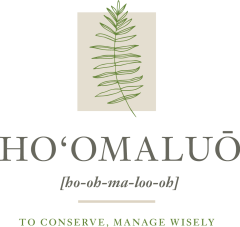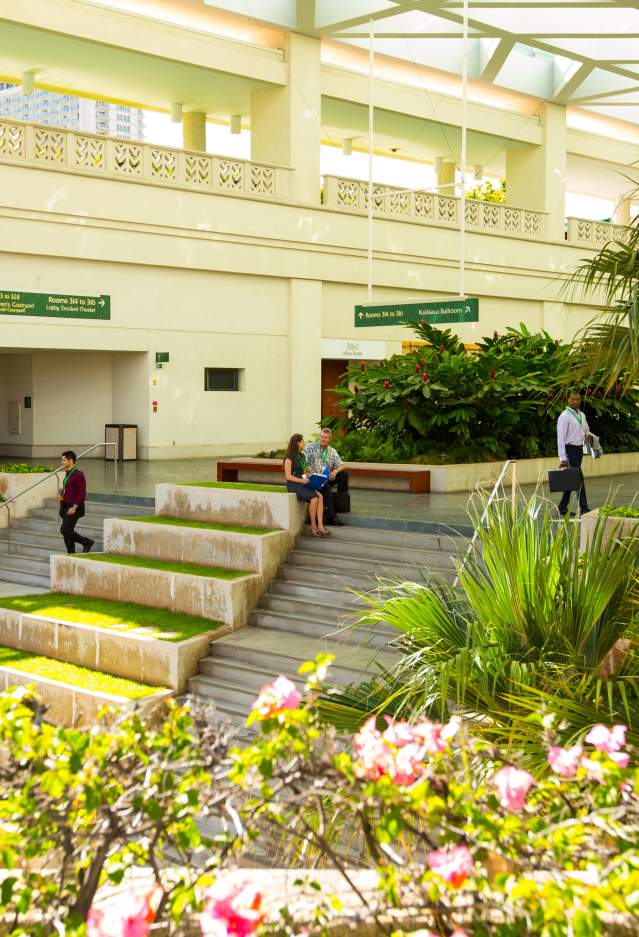Sustainability

Discover a world of sustainable events at the Hawai‘i Convention Center. For over two decades, the convention center has united guests, planners, staff, and communities in a shared mission: preserving the natural beauty of the Hawaiian Islands. Our Hoʻomaluo program embodies this commitment, inspiring everyone we serve through environmental conservation.
From exclusive turnkey environmental programs to our Sustainability Toolkit, event planners and attendees can feel empowered to create unforgettable experiences while minimizing environmental impact during their stay.
Our Initiatives
One Million Trees
Through the Hawaiian Legacy Reforestation Initiative, the Hawai‘i Convention Center is committed to planting 1 million Legacy Trees statewide, contributing to the reforestation of native and endemic trees on O‘ahu and the Island of Hawai‘i. With less than 10 percent of Hawai‘i's old-growth native forests remaining, the HCC invites meeting planners and guests to support these crucial reforestation efforts.
Guests can easily sponsor and dedicate a Legacy Tree, track its growth, and contribute to Hawai‘i's brighter future. Planted in the original Legacy Forest on the Island of Hawai‘i’s Hāmākua Coast, sponsored koa trees will reach over 50 feet, offsetting the carbon footprint of a typical family vacation to the islands.
Carbon Offset Program
In 2022, the Center launched a first-of-its-kind program that provides Carbon Offset opportunities for all meetings and events held at the Center. This initiative is an expansion of the One Million Trees program and provides meeting organizers with the opportunity to offset the carbon footprint of their meeting, as well as offer individual attendees the ability to select and plant endemic and native trees virtually or in-person.
Our Ongoing Sustainable Efforts
Energy Conservation & Efficiency
- Energy-Efficient Cooling and Heating: The center's innovative design features a rooftop canvas sail harnessing Hawai‘i’s trade winds for natural ventilation, reducing the reliance on air conditioning and electricity. It also uses a smaller, energy-efficient jockey chiller when necessary.
- Timed Energy Consumption: The center’s lighting and air conditioning systems are programmed to follow a set schedule and automatically turn off when the building is inactive. Motion sensors in intermittent-use areas also help with energy conservation.
- Sustainable Solutions: The center retrofitted lighting in the ballroom, exhibition halls, parking areas, and back-of-the-house offices and hallways to fluorescent and more efficient configurations.
Water Conservation
- Water-saving appliances: The center boasts automatic dispensers for sink faucets, hand towels, hand soap and hand sanitizer in all restrooms to save on water, towels, and cleansing products. It also features low-flush toilets, urinals and low-flow aerators in sinks and showers throughout the building.
- Low-Irrigation Xeriscaping: Twenty-five percent of the center’s lawn space is artificial turf in an effort to reduce the need for watering. The rest of the landscape utilizes drip irrigation in the landscaping to minimize water use.
- Reclaimed water: The center uses recycled water to water plants, clean the facility, dishwash, and inside the barrels that are used to tie down tents for our rooftop events.
Air Quality
- No Smoking: The Center established a building-wide no-smoking policy to maintain optimum air quality. Designated smoking areas are located to have minimal impact on public air quality.
- Reduced Vehicle Emissions: Staff members use self-pedal bicycles, electric carts and propane-powered lifts, reducing the need for petroleum products, thereby improving air quality. It also encourages attendees to take alternative modes of transportation, such as Honolulu’s new bikeshare program, Biki, which has a station onsite.
Waste Reduction
- Recycling Programs: The center recycles glass, plastic, aluminum, paper, and cardboard from events and all administrative offices. Recycle receptacles for attendee and client use are placed in meeting rooms, public areas, convention offices and at food and beverage events.
- Composting: Green waste collected from landscaping areas is composted and recycled into mulch. Disposable food and beverage service ware is biodegradable and compostable.
- Equipment Donation: Equipment and materials no longer necessary are offered to other State of Hawai‘i agencies or community organizations. Used computers, monitors, and keyboards are recycled through a local service that repurposes current equipment for local communities and recycles older equipment.
- Mitigating Food Waste: Food that is prepared but not served is donated to Aloha Harvest, which then distributes it to charitable organizations. Food waste is used for animal feed locally.
Sustainable Purchasing
- Supporting Local: HCC encourages a “buy local” procurement policy whenever possible. This extends to Hawai‘i-sourced food products and items created and produced in Hawai‘i, thereby reducing the shipping and packaging needs for products delivered to the center.
- Locally Sourced Foods: Food and Beverage buys from local suppliers and producers and offers menus featuring local tastes and products. 808 Coffees Café, a coffee kiosk on the meeting room level serves only locally grown and produced coffee.
Genki Ala Wai Project (Genki Balls)
In collaboration with the nonprofit Genki Ala Wai Project, a nonprofit group under the Hawaii Exemplary State Foundation, meeting planners and attendees can have the opportunity to create and deploy "Genki Balls" into the Ala Wai Canal to assist with Ala Wai ecosystem restoration. Through bioremediation, or the use of living organisms to remove pollutants from soil and water, the nonprofit organization is working to make the Ala Wai Canal fishable and swimmable within 7 years. The tennis ball-sized Genki mud balls contain a mixture of clay soil, rice bran, molasses, water and Effective Microorganisms (EM)-1 solution, which helps digest the canal’s polluted sludge.
Our Certifications and Awards
LEED Gold Certification
In 2018, after a thorough review process of their criteria, the Hawai‘i Convention Center was awarded LEED v.4 O+M: Existing Buildings Gold Certification by the U.S. Green Building Council. It is the first and only “public assembly, convention center” to earn this kind of certification in the U.S., and is the only one in Hawai‘i. The center was re-certified Gold in 2021.
Awards & Accolades
The Hawai‘i Green Business Program (HGBP) has recognized the convention center for its energy efficiency and sustainable business practices throughout the years. From attaining Po’okela Level (Excellence in Leadership) in 2018 to receiving the Hawaiʻi Green Business Program award in 2020 to 2024, the convention center is committed to operate in an environmentally, culturally and socially responsible manner.
In addition to these distinctions, the Center was honored by Pacific Edge Magazine's 2022 Business Achievement Awards as a winner in its “Commitment to Green” category.
